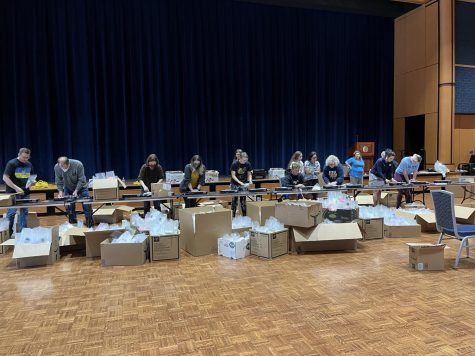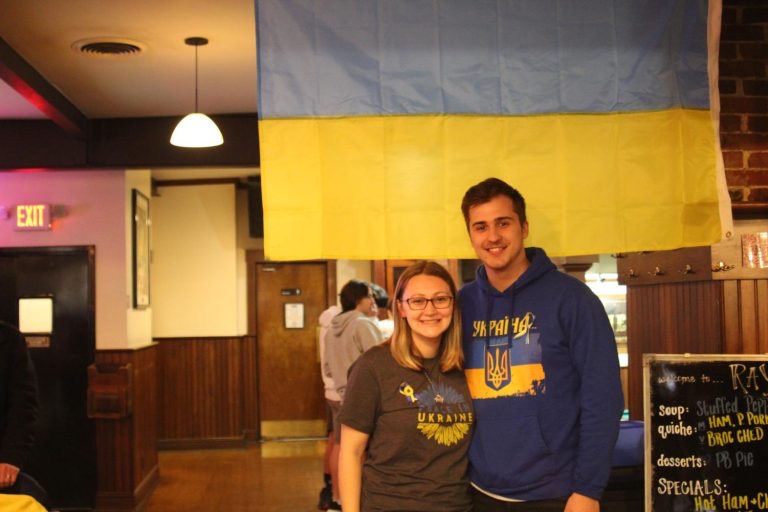How Kent State students, faculty are helping to support Ukraine
Lydia Lisowsky and her cousin Paul, both with Ukrainian roots. (Courtesy of Lydia Lisowsky)
May 4, 2023
Lydia Lisowsky’s grandparents migrated from Ukraine to the U.S. during World War II. She grew up speaking fluent Ukrainian, practicing the culture and attending Ukrainian schools in the area. Now, she is preparing to graduate this May with her master’s of education in higher education, administration and student affairs.
“I am here in a safe place because if my grandparents hadn’t made that sacrifice years ago, that is exactly where I would be right now,” Lisowsky said. “It’s really hard to think about that and know that people that are my age and younger are experiencing so much trauma.”
On Feb. 24, 2022, Russia invaded the country of Ukraine, attacking the country’s capital Kyiv, after decades of political tension. Russia’s war on Ukraine impacted the world in many different ways economically, politically and personally to many.
The United Nations Office of The High Commissioner for Human Rights reported March 20, 2023, that there are 22,209 total known civilian casualties in Ukraine, with 8,317 of those killed and 13,892 injured.
“I am a Ukrainian-American, I was not born there and I am a U.S. citizen, I am protected here,” Lisowsky said. “But if I was there as a woman and as someone with Ukrainian tattoos, it is one of the first things they look for and I would have been dead twice.”
After the invasion, Lisowsky and her cousin Paul decided to partner with The Plast National Scout Organization of Ukraine, which Lisowsky takes part in, to gather supplies to send to Ukraine.

Some of these supplies included medical necessities, clothing, children’s winter jackets and white sheets to cover the tanks in the snow.
“It’s just a really personal thing for me and when the war broke out it was very hard for me. I felt like I needed to do something, I felt like I had a responsibility,” Lisowsky said. “So whatever I can do to help, I am going to do that.”
She and her cousin started fundraising to support their efforts and organized a packing event on campus to get as many people involved as possible. Lisowsky said their goal was to create 3,000 kits and they ended up making 3,100 kits.
John West, emeritus professor and previous director of the Liquid Crystal Institute and vice president for research at the university, worked closely with a research group located in Kyiv and has many colleagues and friends in Ukraine.
“It’s the first time I can think of where a city where I knew really well was bombed,” West said. “It hit me really hard actually that I knew places, people that I knew had family there and I have friends there.”
Similar to Lisowsky’s efforts, West and his colleague Torsten Hegmann decided to create a fund to support Ukrainian students and refugees, and now scientists and scholars, who needed to continue their studies and research.
“We really morphed and once we realized that the game had changed and the idea was to keep things stable there, we kind of changed the fund so that we could sponsor research groups and scholarly activity for people who wanted to stay,” West said.
Eight million Ukrainians have left the country since the invasion, most fleeing to neighboring countries like Poland, and five million are internally displaced.
“That’s a huge demographic shift,” Richard Steigmann-Gall, professor and faculty advisor to the Kent State College of Democrats, said. “You are looking at people who will probably just stay in their new homes permanently because of security, and safety, they would have found jobs by now, so you strike roots.”
Russia occupied Crimea in 2014 and now occupies 15-20% of Ukraine’s land.
Along with the physical claims over Ukraine, Russia is not only influencing the political side of the war but seems to be aiming to affect society economically as well.
“You capture the economy, you capture the political world,” Gabriella Paar-Jakli, Hungarian diplomat and professor of political science, said. “Then there you go, you basically have an influence on any society and political and economical system, and most people are not aware.”
Rudin Mucaj is from Albania, a small country that borders the Adriatic and Ionian seas and lies around 800 miles from Ukraine. Even 800 miles away, the country of Albania is still seeing the effects from the war.
“How the war affected Albania was mostly economic,” Mucaj said. “There was a terrible increase in pretty much anything from food, to gas, to water and to electricity.”

According to CEIC, the average monthly income in Albania from December 2022 was $654.
“Albania is a poor country. My family is a working class family and the whole family made around $8,000 a year,” Mucaj said. “So $8,000 a year and now you have to pay almost $9 a gallon for gas. It puts working class families and poor families in a much dire situation.”
Mucaj graduated in 2022, just a few months after the invasion, with his master’s in history and public administration. Now, he works with Asian Services in Action (ASIA) to work with refugees and immigrants, some who are from Ukraine.
ASIA provides refugees, parolees and immigrants with services like interpreting and translations, healthcare, finding jobs, community engagement and more.
There are many resources and options that are available to help support Ukraine and refugees on and off campus, but also in the palms of our hands.
“Social media can be a good thing. There are some really good places out there to get some good information on it,” Lisowsky said. “There are things that you can do on social media even if it’s just reposting accounts that are reputable.”
Here are some sources that you can contact, follow and donate to today.
Razom, which means “together” in Ukrainian, is a non-profit organization that was started in 2014 and has been supporting Ukraine throughout the war by supplying them with essentials like medical supplies.
Cleveland Maidan is a local non-profit that began in 2014 that supports Ukraine by donating cars, medical supplies, funding prosthetics for soldiers with leg amputations, search and rescue equipment and providing refugee services.
“Russians specifically have tried to wipe Ukrainians off the face of the Earth,” Lisowsky said. “But we are still here! We are stubborn people and we are not going down without a fight.”
Ashley Caudill is a reporter. Contact her at [email protected].












